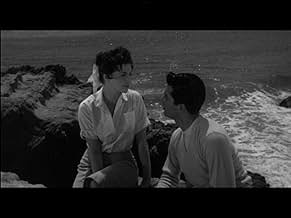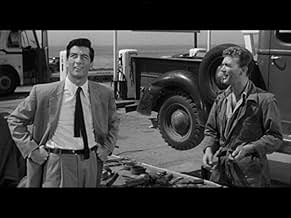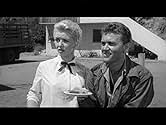अपनी भाषा में प्लॉट जोड़ेंA mental patient with a violent past is released from the institution, against the advice of his doctors, and sent back to his old neighborhood. Realizing that he can't handle the pressures ... सभी पढ़ेंA mental patient with a violent past is released from the institution, against the advice of his doctors, and sent back to his old neighborhood. Realizing that he can't handle the pressures of big-city life, and not wanting to commit the kinds of crimes that got him put away in t... सभी पढ़ेंA mental patient with a violent past is released from the institution, against the advice of his doctors, and sent back to his old neighborhood. Realizing that he can't handle the pressures of big-city life, and not wanting to commit the kinds of crimes that got him put away in the first place, he hops a bus heading out of the city and winds up in a small coastal town... सभी पढ़ें
- Vernon
- (as Eddy C. Waller)
- Male interviewer
- (as Richard Cutting)
- Bus Driver
- (बिना क्रेडिट के)
- Boy
- (बिना क्रेडिट के)
- Mailman
- (बिना क्रेडिट के)
- Waitress
- (बिना क्रेडिट के)
फ़ीचर्ड समीक्षाएं
Roy (Ray Danton) has been hospitalized in a psychiatric hospital for a couple years. After all, he is moody and has fits of anger that make him dangerous. However, the hospital is over capacity and needs the beds and Roy is discharged sooner than his therapist wishes.
What follows is Roy's moving to the Los Angeles area and his trying to adjust to life on the outside. He seems like he's trying hard to make it and you want to see him succeed. He has a lovely girlfriend and a job. However, about midway through the film, he goes berserk and murders someone with only moderate provocation...and here's where it seems that the film is no longer about mental illness and rehabilitation but is more a horror-suspense movie.
As I mentioned above, the film tries to work both sides and the overall story is sadly impacted. It could have worked either way, with him being a dangerous menace or him getting his life together...but not as it was. It forgets realism and just goes for thrills and frights...complete with 'looney' sound effects! As a result, the film is just okay when it could have been so much more.
Owing to economic pressures, Danton gains release, against the better judgement of his doctor, from the mental institution where he's been confined - there was a vague, violent incident in his past. But he's unequipped for the outside world. In Los Angeles, he bolts from a job interview when asked to fill in the holes in his resumé and starts to assault a man in the street he bumps into. Trying a geographic cure, he gets aboard a Greyhound, takes a liking to a little coastal town during a rest stop, and decides to stay.
He books a room in an off-season motel where he raises suspicions in the owner (Willis Bouchey) but falls for his daughter (Colleen Miller). The salt air, a new job in the aerospace industry and the prospect of romance do wonders until Bouchey, having ferreted out the dark secret, locks Danton out of his room and bids him hit the road. Whereupon Danton kills him, making it look like a robbery, and carries on his courtship with the bereaved Miller as if nothing had happened. But when evidence that he played a part in the slaying starts surfacing (even though one character observes that `A lot of people spill nail polish on money'), his false façade of stability starts to topple....
The man behind The Night Runner, Abner Biberman, was a minor actor (often playing Asian roles!) from the mid-1930s until he turned to directing in the mid-1950s. Frustratingly, he shows glimmers of talent, even sensitivity, but ultimately chooses a facile, melodramatic path (though Universal International Pictures may have forced his hand). The script is prescient about the too-early release from institutions of psychiatric patients not yet ready to cope with the stresses and responsibilities of daily living, an enlightened view underscored by Danton's largely restrained performance. But then the inexorable machinery of the suspense plot demands that he erupt as a psycho-killer. Still, the movie's end unmasks Danton as not quite a monster but rather a misfit with some sad insight into why the `normal' life he craves can never be his.
I was more than rooting for Ray Danton, since it's was so easy to identify with his predicament - trying to start a new life and readjust to society after a couple of years in a mental institution. The realistic opening of the state hospital's board debating whether he was ready to be released played 100% true.
The setting at cottges off the beach created an idyllic atmosphere for Ray to make progress in the company of sympathetic local folk -like pregnant Merry Anders and her friendly husband. Just when everything finally is going aces for Ray, including a beautiful girlfriend in Colleen Miller, the prejudice and meanness of her dad causes him to explode with fatal consequences. At this point, we know it's only a matter of time before he will meet his fate, but the suspense is well-handled, and the Gothic climax (replete with waves crashing into the rocks on shore) packs a wallop.
The casting against type of pretty boy/suave Ray Danton as our hapless antihero works wonders for the powerful pathos of the ending. Definitely a winner by director Abner Biberman and writer Gene Levitt (who notably produced "Combat!" for TV).
Abner Biberman's last movie as director -- he continued to work on episodic television until the early 1970s -- is a well-meaning study with a plea for better psychiatric funding. It's directed in a dry fashion, and Danton is pretty good in the lead role, aided by George Robinson's subtle lighting changes and a score that well reflects the moods of the lead.
क्या आपको पता है
- कनेक्शनReferenced in Where's Marlowe? (1998)
टॉप पसंद
- How long is The Night Runner?Alexa द्वारा संचालित
विवरण
- चलने की अवधि1 घंटा 19 मिनट
- रंग
- पक्ष अनुपात
- 1.85 : 1
इस पेज में योगदान दें


































